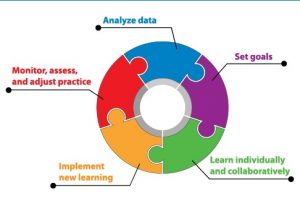Learning in communities can be considered a process of learning that takes place within a community or social group, which be informal or formal. In fact, learning in communities involves shared experiences, ideas, and perspectives.

Learning in communities can occur through online discussion forums, social media platforms, or even in physical communities e.g. workshops.
In my opinion, the utilization of new technology o facilitate collaborative learning is one of the key aspects of networked collaborative learning. In fact, it highlighters the usage of digital tools and resources to support collaboration, communication, and knowledge sharing among students.

Source: Becoming a Learning Team: A Guide to a Teacher-led Cycle of Continuous Improvement
On the other hand, learning in communities and networked collaborative learning is not always easy and without challenges. For instance, maintaining engagement and motivation among students can be difficult in a digital environment. Moreover ensuring equitable participation and access to resources can be a challenge in diverse groups.

Overall, both learning in communities and networked collaborative learning have the potential to be powerful tools for learning and growth, particularly in today’s digital age where connectivity and collaboration are increasingly important skills for success.
As a teacher can effectively apply learning in communities and networked collaborative learning by implementing the following strategies:
I think, in order to have efficient collaborative learning, a teacher needs to consider several parameters. For instance, establishing a collaborative learning environment by encouraging students to work together, share ideas, and support each other in their learning journey.
Introducing, and utilizing online platforms and tools to facilitate communication and collaboration among students. For instance, online forums, discussion boards, or collaborative document editing platforms can be employed to foster a sense of community and facilitate collaborative learning.
Promoting peer feedback and assessment by encouraging students to provide constructive feedback to their peers during collaborative activities. This can help students develop critical thinking skills, deepen their understanding of the subject matter, and improve their own work. Incorporate peer assessment as part of the evaluation process, allowing students to evaluate and provide feedback on each other’s contributions.
Charlotta Edlund May 15, 2023
Hello Sahar!
Thank you for your reflection on Topic 3. I particularly found the model that you visualized from “Becoming a Learning Team: A Guide to a Teacher-led Cycle of Continuous Improvement”. It was presented in your text, but it would also have been nice to hear your thoughts about it and how you apply it into your context when teaching or collaborating in projects.
Sahar Tahvili May 22, 2023 — Post Author
Thanks 🙂 please see the updated version
Charlotta Edlund June 9, 2023
I agree with your new reflections and especially the last paragraph: to encourage collaborative learning and creating engagement, one important variable is feedback. Whether it’s peer feedback or teacher-peer feedback, FEEDBACk is always the thing students ask for most.
ELISABETH AHLINDER May 25, 2023
Interesting thoughts and nice a nice read to with all the pictures! I thinkt that the facilitating and encpouragement of student interaction and collaboration is really important too. We as teachers might have to rethink our roles a bit and find a way to both encourage students to interact but also to create their own learning envirnoment. The gaol being that our students, when they leave the university and go out to the real world, will have the tolls and knowledge that they need to create creative teams and work effectively in teams.
Amare Fentaye June 9, 2023
Hi Sahar,
Your reflection on learning in communities and networked collaborative learning is insightful and highlights the importance of utilizing technology to support collaboration and knowledge sharing among students. You rightly point out the challenges that can arise in maintaining engagement and ensuring equitable participation in a digital environment. I also agree with your suggestions for teachers to create a collaborative learning environment, utilize online platforms, and promote peer feedback and assessment which are practical and effective strategies. What ethical considerations should be taken into account when engaging in networked collaborative learning?
Amare Fentaye June 16, 2023
Your reflection on learning in communities and networked collaborative learning is insightful and highlights the importance of utilizing technology to support collaboration and knowledge sharing among students. You rightly point out the challenges that can arise in maintaining engagement and ensuring equitable participation in a digital environment. I also agree with your suggestions for teachers to create a collaborative learning environment, utilize online platforms, and promote peer feedback and assessment which are practical and effective strategies. What ethical considerations should be taken into account when engaging in networked collaborative learning?